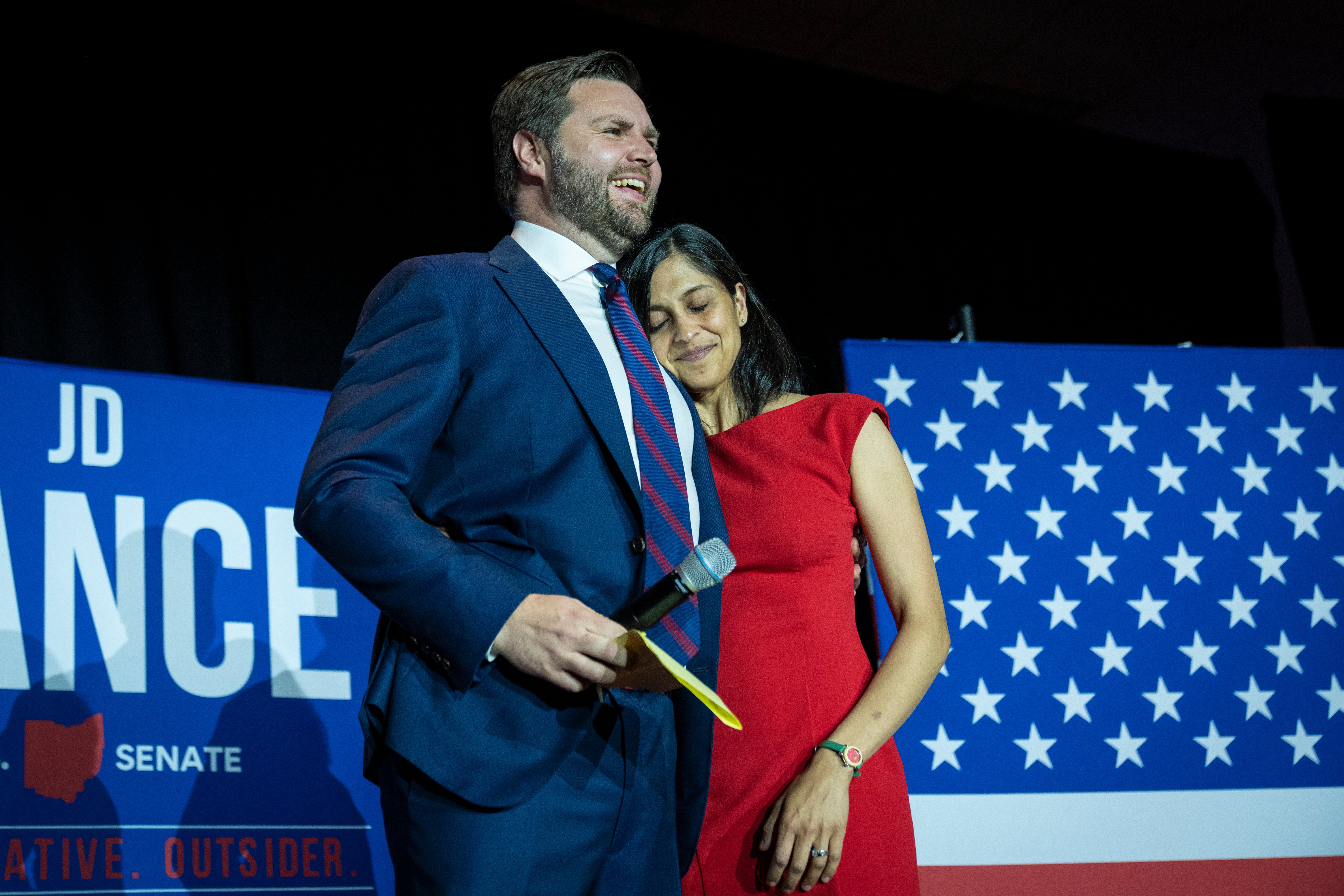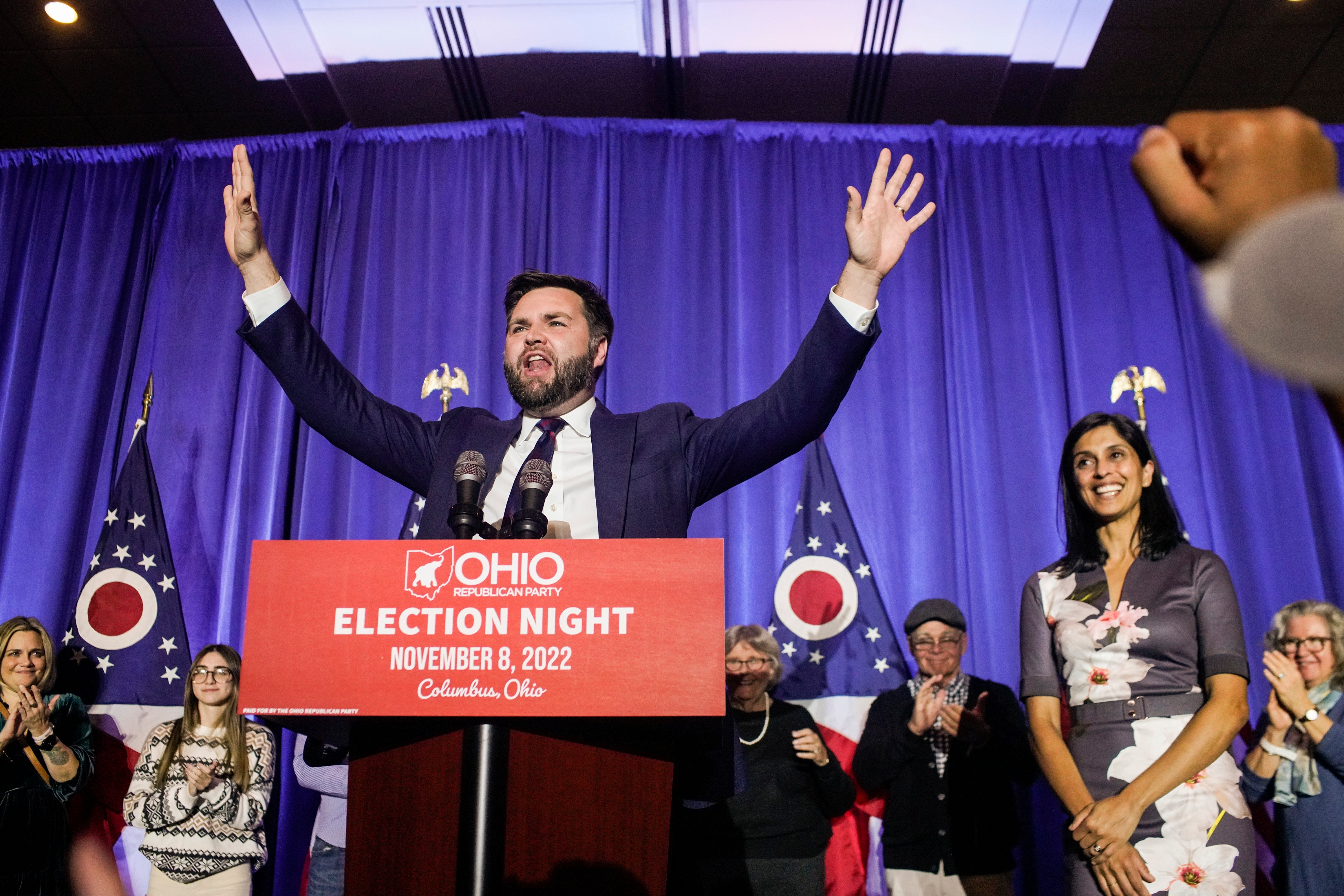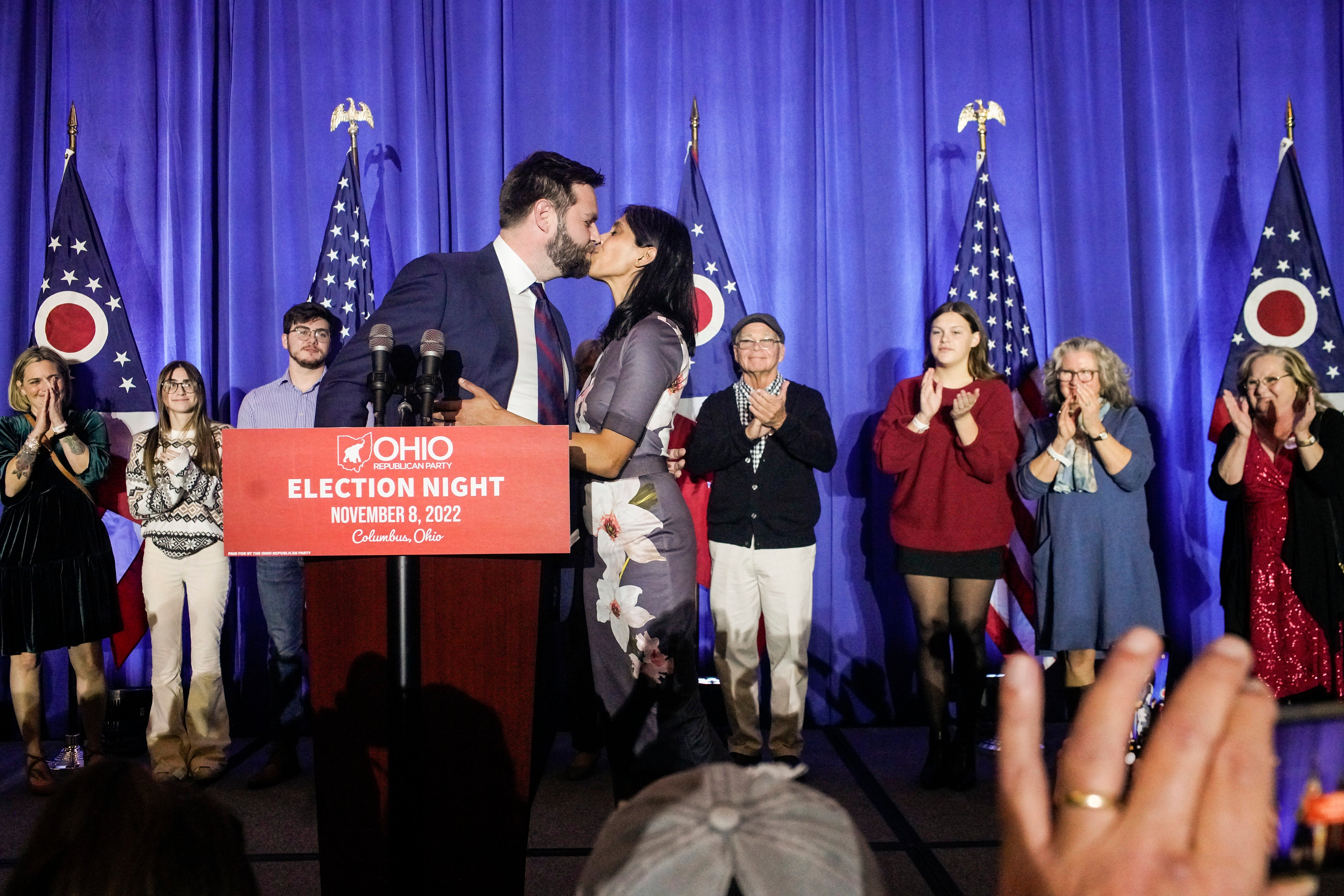They were paired as writing partners for their first major assignment at Yale Law School – a striking high-achiever daughter of immigrants and a Marine veteran “hillbilly” who could trace his family’s Scots-Irish roots back generations in the Appalachian mountains.
It may sound trite and corny, but Usha Chilukuri and JD Vance truly came from vastly different worlds. And they fell in love in yet another – at an East Coast Ivy League across the country from Usha’s childhood California home and across a gaping cultural divide from her future husband’s Rust Belt hometown.
In less than 15 years the couple, now the Vances, have elevated the American Dreams of two families to new heights as they try for the White House alongside the 45th president.
And it all began at a class on campus – where Vance quickly “fell hard,” he writes in his 2016’s Hillbilly Elegy: A Memoir of a Family and Culture in Crisis.

“As luck would have it, we were assigned as partners for our first major writing assignment, so we spent a lot of time during that first year getting to know each other,” writes Vance, named this week as Donald Trump’s VP pick.
“She seemed some sort of genetic anomaly, a combination of every positive quality a human being should have: bright, hard-working, tall, and beautiful … she had a great sense of humor and an extraordinarily direct way of speaking.”
Vance had grown up in Middletown, Ohio, navigating familial dysfunction in a clan that hailed from Jackson, Kentucky, clinging to its Appalachian traditions and values. It was a triumph for him to earn an undergraduate degree from Ohio State after four years in the Marines and an even bigger coup to begin Yale Law School.
For Usha, whose Indian immigrant parents are both professors, the trajectory was a more natural course; after excelling academically throughout her youth in suburban San Diego, she’d attended Yale for undergrad, too – graduating summa cum laude with a degree in history before studying in England as a Gates Cambridge Scholar, where she earned a master of philosophy degree in early modern history.
Upon her return to New Haven, Vance writes, Usha acted as his “Yale spirit guide” who “knew all of the best coffee shops and places to eat.
“Her knowledge went much deeper, however: She instinctively understood the questions I didn’t even know to ask, and she always encouraged me to seek opportunities that I didn’t know existed,” he writes – advising him to attend office hours, for example, so he could take advantage of the professor-student engagement that was a “part of the experience.”
“In a place that always seemed a little foreign, Usha’s presence made me feel at home.”

The relationship started as a friendship; the year after Hillbilly Elegy’s publication – and just weeks before the birth of their first child – Usha spoke of her own first impressions.
“We were in all our classes together, and so I saw him several hours a day,” she told NBC News in 2017. “And then we were assigned to work together on a brief. We were friends, and I liked that he was very diligent, and he would show up for these like 9am appointments that I set for us to start working on the brief together.”
Vance, however, was already smitten.
“I had dated other girls before, some serious, some not,” he writes. “But Usha occupied an entirely different emotional universe. I thought about her constantly. One friend described me as ‘heartsick’ and another told me he had never seen me like this.
I mean, I’ve never seen anybody so starstruck. It was love at first sight.
Law professor Amy Chua, on her student JD Vance’s new relationship
“Toward the end of our first year, I learned that Usha was single, and I immediately asked her out. After a few weeks of flirtations and a single date, I told her that I was in love with her. It violated every rule of modern dating I’d learned as a young man, but I didn’t care.”
His gamble paid off, and the two embarked upon a lasting relationship that was nurtured by Yale professor Amy Chua, author of 2011’s Battle Hymn of the Tiger Mother – who also encouraged Vance to write his memoir.
“He describes it as ‘a lightning bolt’ – and I saw that,” Chua told NBC in 2017, calling the couple an “extremely unlikely” pairing. “I mean, I’ve never seen anybody so starstruck. It was love at first sight.”
When Vance was considering a federal clerkship, Chua advised him to forget it – partially to keep Usha in his life.
“She knew I had a new girlfriend and that I was crazy about her,” Vance writes, repeating Chua’s words: ‘This clerkship is the type of thing that destroys relationships If you want my advice, I think you should prioritize Usha and figure out a career move that actually suits you.”
He withdrew his application – and he and Usha decided to go through the clerkship process together, both ending up in northern Kentucky, not far from where he grew up. They liked their judicial bosses so much that they eventually asked them to officiate the couple’s wedding years later – though it was not all plain sailing up to that point.
Back at law school after the clerkships, “there were signs that things weren’t going so well, particularly in my relationship with Usha,” Vance writes.
“I had no idea how to deal with relationship problems, so I chose not to deal with them at all. I could scream at her when she did something I didn’t like, but that seemed mean. Or I could withdraw and get away … The thought of fighting with her reduced me to a morass of the qualities I thought I hadn’t inherited from my family: stress, sadness, fear, anxiety. It was all there, and it was intense.
“So I tried to get away, but Usha wouldn’t let me,” he writes. “I tried to break everything off multiple times, but she told me that was stupid unless I didn’t care about her … Usha hadn’t learned how to fight in the hillbilly school of hard knocks.
“The first time I visited her family for Thanksgiving, I was amazed at the lack of drama. Usha’s mother didn’t complain about her father behind his back. There were no suggestions that good family friends were liars or backstabbers, no angry exchanges between a man’s wife and the same man’s sister. Usha’s parents seemed to genuinely like her grandmother and spoke of their siblings with love.”
Usha was teaching him not only about Yale but about healthy relationships – as well as more practical matters such as how to properly utilize utensils in front of potential employers at fancy dinners: ‘Go from outside to inside, and don’t use the same utensil for separate dishes; oh, and use the fat spoon for soup.’

The couple’s relationship endured and grew throughout the rest of law school, and their families met for the first time at graduation. The young lawyers then moved to Cincinnati, Ohio, for one-year clerkships, building a home with two dogs and marrying in an interfaith ceremony in Eastern Kentucky; Usha was raised Hindu, while Vance grew up in the Christian tradition. At the time of their wedding, she was a registered Democrat.
“My entire family showed up for the occasion, and we both changed our name to Vance,” his maternal grandparents’ surname, he writes.
Usha pursued a career in corporate litigation before earning a Supreme Court clerkship – which she began the month after the June 2017 birth of the couple’s first child, Ewan Blaine Vance.
“I think we have sort of sealed ourselves emotionally that the next year is just going to be pretty chaotic,” Vance told NBC in the weeks before Ewan’s birth. “And I think of that as like a classically hillbilly thing: You don’t plan the baby around your life, you plan your life around the baby and we’ll figure it out.”
The couple went on to have two more children as Vance’s profile rose – Vivek, born in 2020, the same year of the movie adaptation of Hillbilly Elegy; and Mirabel, born in 2021, the year before her father was first elected to office as an Ohio Republican senator.
Usha, with three young children and a legal career of her own, has appeared with her husband but has not been overly visible to date during his political career. She’s also on the board of the Cincinnati Symphony Orchestra, according to her LinkedIn profile.
She did, however, star in a Senate campaign ad for her husband – “where my favorite person tells my story,” Vance posted on Instagram alongside the video.
In a recent Fox News interview, she said her husband’s first campaign – for Senate – had been “a shock.
“It was so different from anything we’d done before,” she said. “But it was an adventure.”
Following Trump’s VP announcement, she resigned from law firm Munger, Tolles & Olson, where her work had focused on fields including higher education, local government, entertainment and technology, The Washington Post reported – citing an archived version of her professional biography which has now been taken down.
“Usha has informed us she has decided to leave the firm,” Munger, Tolles & Olson said in a statement Monday. “Usha has been an excellent lawyer and colleague, and we thank her for her years of work and wish her the best in her future career.”
Usha, meanwhile, gave a statement to SFGate; the firm has San Francisco offices.
“In light of today’s news, I have resigned from my position at Munger, Tolles & Olson to focus on caring for our family,” the 38-year-old said. “I am forever grateful for the opportunities I’ve had at Munger and for the excellent colleagues and friends I’ve worked with over the years.”
If the Senate campaign was “a shock” and “an adventure,” one can only imagine what’s in store for Usha and the Vance family as they enter the Trump fray. Usha seemed philosophical in a recent interview with Fox before the announcement.
“I’m not raring to change anything about our lives right now, but I believe in JD and I really love him,” she said. “And so we’ll just sort of see what happens with our life. We’re open.”

